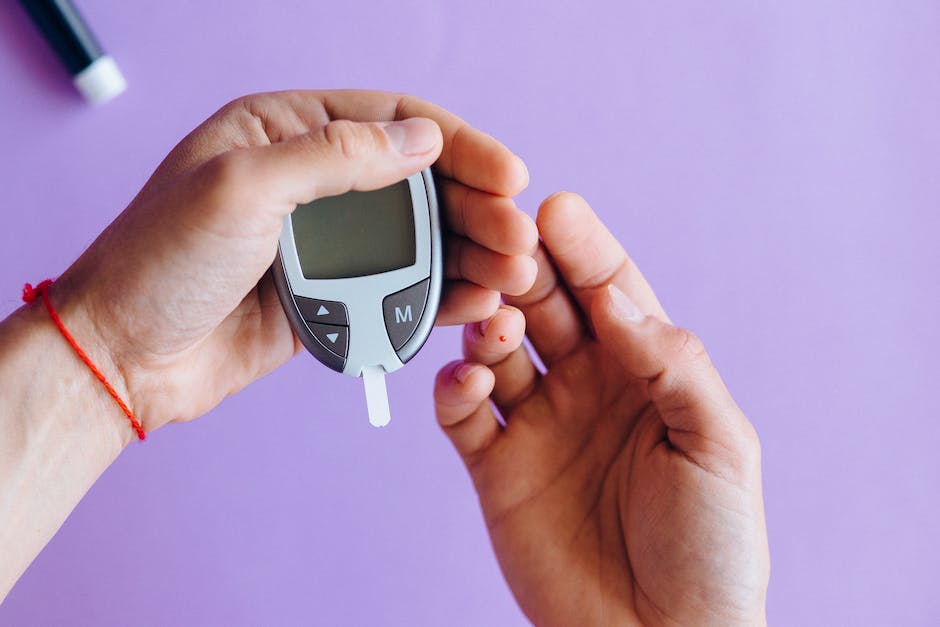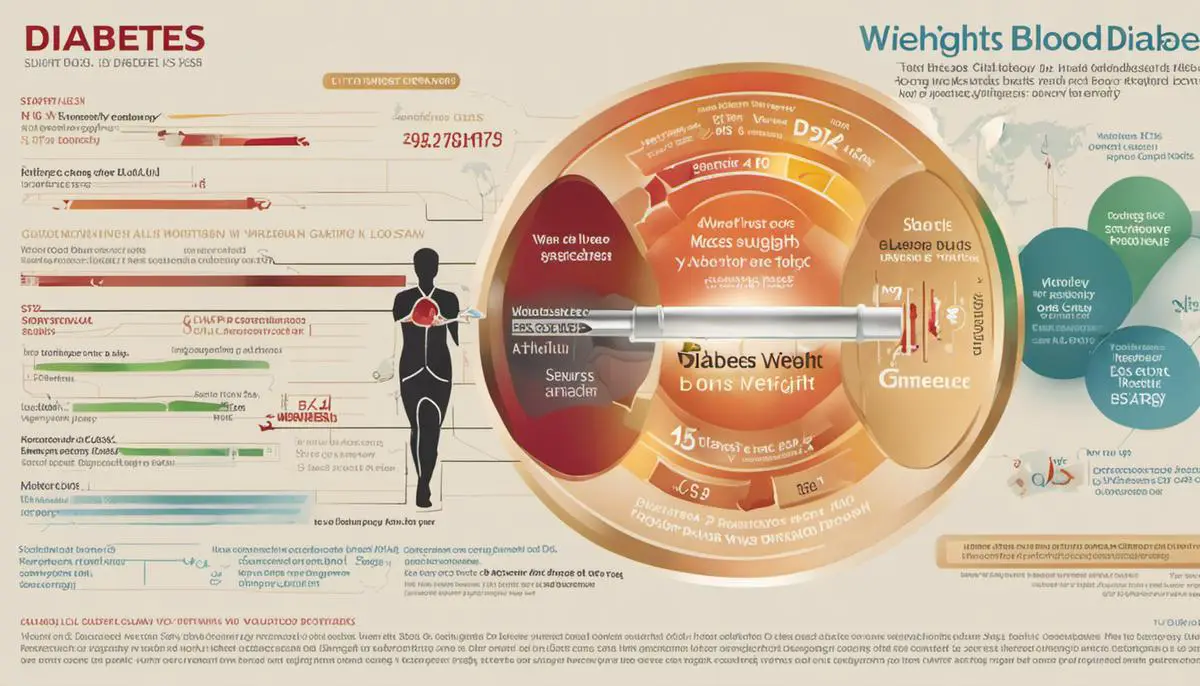Diabetes, a chronic condition affecting countless individuals, presents a unique interplay with weight, particularly in men. The disease perturbs the body’s ability to convert food into energy effectively, causing erratic fluctuations in weight – either an increase or a disturbing decay in heft. This essay unravels the intricacies of this relationship, shedding light on the types of diabetes, their symptoms, and how they precipitate these weight changes. We will venture further into why such weight changes occur and the significant impact this has on a man’s general health, primarily when it translates into unusual or unexplained weight loss.
Understanding Diabetes and Weight Loss
Diabetes and Weight: The Connection
Diabetes is a chronic medical condition where the body’s ability to produce or react to insulin, a hormone responsible for regulating blood glucose levels, is impaired. This results in abnormally high levels of sugar in the blood. In terms of weight changes, diabetes affects your body’s conversion of food into energy, which can sometimes lead to unusual or unexpected weight loss.
How Diabetes Affects Weight
Our bodies break down sugars and carbohydrates from the food we consume into glucose, which cells use for energy. Insulin’s role is to help these cells absorb glucose. However, in individuals with diabetes, their bodies either can’t produce sufficient insulin (Type 1 diabetes) or cannot effectively use it (Type 2 diabetes). As a result, glucose remains in the bloodstream, causing high blood sugar levels.
In response to this, the body starts burning stored fat for energy, leading to weight loss. It’s crucial to note, however, that this can occur regardless of whether a person is trying to lose weight. This unusual weight loss can be notably pronounced in men with uncontrolled diabetes.
Types of Diabetes and Weight Fluctuations
There are two main types of diabetes that can cause weight loss: Type 1 and Type 2 diabetes. Type 1 diabetes often leads to weight loss. This condition can cause the body to start breaking down muscle and stored fat to use as fuel instead of sugar and carbohydrates. If not managed, this can be incredibly dangerous, leading to a life-threatening condition known as diabetic ketoacidosis.
On the other hand, weight loss isn’t as common with Type 2 diabetes. Yet, if someone with Type 2 isn’t properly managing their diabetes or isn’t aware they have the disease, they could experience weight loss.
Warning Signs of Diabetes to Watch Out For
Routine check-ups can help you better understand how diabetes may affect your weight. However, look out for warning signs which include increased urination, excessive thirst, constant hunger, fatigue, blurred vision, and unexplained weight loss. In some men, diabetes symptoms may even include sexual dysfunction and decreased sex drive.
Focusing on Early Detection and Management
Noticing sudden weight loss, which you think might be due to diabetes, is a serious concern that should immediately be discussed with your doctor. Early detection of diabetes can guard against further health issues such as damage to the kidneys, heart ailments, eye disorders, and nerve damage.
The bedrock of managing diabetes and its consequences on weight revolves around maintaining an active lifestyle, enjoying a balanced diet, and adhering to your medication regimen. It’s essential to regularly monitor your blood glucose levels, so necessary adjustments can be made to your treatment to ensure the best possible health outcomes. Regular health check-ups are also vital for tracking progress and refining your treatment protocol as needed.

The Connection between Weight Loss and Diabetes
Understanding the Connection Between Unusual Weight Loss and Diabetes
Diabetes, particularly type 2 diabetes, influences how your body handles blood glucose, or blood sugar, which is crucial for providing energy to your cells. Without effective insulin regulation, blood glucose levels can spike, becoming a hallmark of diabetes.
In certain situations, unusual weight loss might signal diabetes. Such weight loss can occur due to the body’s failure to absorb glucose from the bloodstream efficiently, resulting in the body resorting to muscle proteins as an energy source, causing unexpected weight loss.
Men who have diabetes but are yet to be diagnosed may start losing weight even without making any modifications to their diet or physical activity. This unexplained weight loss can total to 10 to 20 pounds over several months. Thus, it’s essential that any severe, unforeseen changes in weight be promptly investigated by a healthcare professional.
Diabetes: The Silent Progressor
Many individuals with diabetes remain undiagnosed for a significant period of time, as the disease often progresses silently with only subtle symptoms. Symptoms can include increased thirst, frequent urination, constant hunger, tingling or numbness in the hands or feet, blurry vision, and unusual weight loss.
Often, individuals may not identify these symptoms as serious health issues and may not seek medical attention until their diabetes has advanced markedly. The early detection and management of diabetes are critical to stave off complications related to the disease such as heart disease, stroke, kidney disease, and nerve damage.
The Importance of Regular Checkups
Regular health checkups become particularly crucial for men over 45 years of age, as the likelihood of developing type 2 diabetes increases with age. Additional factors that increase the risk include a sedentary lifestyle, a diet low in fruits and vegetables, consistently high blood sugar levels, excessive alcohol consumption, and being overweight or obese.
Unusual weight loss, especially in conjunction with other symptoms, could be a red flag for undiagnosed diabetes and must not be ignored. Any such weight loss should prompt a visit to a healthcare provider for a comprehensive health checkup, including blood tests to measure blood glucose levels.
A Healthy Weight and Diabetes Management
Obtaining and keeping a healthy weight not only mitigates the potential risk of developing type 2 diabetes but is also a key component in managing the disease for those who are already diagnosed. Incorporating a well-balanced diet, regular exercise, and consistently monitoring one’s health are practices that can significantly aid in managing diabetes. Consulting professionals like dietitians for nutritional advice and fitness trainers for targeted exercise routines can tailor a management plan to an individual’s unique needs.
While weight loss is often seen as a positive progress, unanticipated weight loss might be indicative of an underlying health issue. Therefore, developing an understanding, maintaining regular health inspections, and addressing any unexpected changes swiftly are essential steps in ensuring holistic health and managing diseases such as diabetes.

Impact of Unusual Weight Loss on Men’s Health
Recognizing Unexpected Weight Loss in Men
Sudden, unexplained weight loss, defined as a decrease of 10 pounds (4.5 kilograms) or 5% of an individual’s usual body weight within six to twelve months without a conscious effort to lose weight, can be attributed to a variety of factors. These might include emotional stress, depression, certain cancer types, thyroid issues, or digestive disorders, among others.
In men, such unexpected weight loss can be worrisome as it may signify the onset of severe health conditions that should not be overlooked. Aside from negatively impacting multiple bodily functions, unanticipated weight loss can result in weakened muscles, decreased immunity, and diminished bone density. The reduction in muscle mass is particularly critical in men as it plays a significant role in maintaining their strength and mobility.
Unusual Weight Loss and Diabetes in Men
One health condition linked with unusual weight loss in men is diabetes, specifically type 1 diabetes. This ailment affects how the body processes glucose, which is required for energy. In individuals with type 1 diabetes, the immune system destroys insulin-producing cells in the pancreas, which results in high glucose levels. As the body cannot use glucose effectively for energy, it starts breaking down stored fat and muscle to get energy, leading to weight loss.
Additionally, high blood sugar levels can make one urinate more frequently, resulting in fluid loss and, subsequently, weight reduction. Thus, men experiencing sudden weight loss, increased thirst, frequent urination, and fatigue should consider getting tested for diabetes.
In contrast, managing type 2 diabetes often involves weight loss for overweight individuals. However, this needs to be done safely and slowly, typically about 1-2 pounds per week. Any sudden unintended weight loss here could be worrisome and may indicate another underlying health condition.
Psychological Impact and Lifestyle Changes
Unusual weight loss, especially when associated with diseases like diabetes, can have significant psychological impacts. It can lead to feelings of fear, anxiety, and depression – a reflection of the person’s concerns about their health. This emotional stress, if unmanaged, can further exacerbate weight loss and poor glucose control.
Men experiencing unexpected weight loss need immediate lifestyle changes. A balanced diet, regular exercise, and adequate sleep quality are critical to maintaining a healthy weight. Incorporating more protein and nutrient-rich foods can prevent muscle wasting and boost overall health. Similarly, moderate physical activity can improve muscle mass and facilitate healthy weight re-gain.
Paying Attention to Weight Management in Diabetes
Weight management is paramount in diabetes care. Keeping your weight in a healthy range facilitates better blood sugar control, reduces heart disease risks, and minimizes the requirement for diabetes medication. Excess weight can interfere with insulin efficiency, causing insulin resistance.
It is important for men dealing with diabetes to undertake weight loss carefully. Rapid weight loss can trigger muscle wasting and strip the body of crucial nutrients. Hence, it’s imperative for men with diabetes to interact with a healthcare professional or a dietitian about the safest ways to shed pounds.
Healthcare providers typically suggest a mix of healthy eating patterns, regular physical activity, and medication in some cases, to manage diabetes. Regular check-ins with healthcare providers are vital to monitor progress and adjust the treatment plan as needed.

Management Techniques and Prevention Measures
Deciphering the Association Between Sudden Weight Loss and Diabetes in Men
Sudden weight loss can occasionally signal a serious condition such as diabetes, although it isn’t invariably so. In some men suffering from diabetes, the body’s ineffective glucose absorption could lead to abrupt, unanticipated weight loss. This can occur when the body attempts to offset energy deficits, resulting in the degradation of muscle tissue and fat reserves.
Dietary Modifications to Manage Diabetes and Weight Loss
Managing both weight loss and diabetes involves making certain changes in your diet. The idea is to consume foods that will not spike blood sugar levels drastically. Foods high in fiber and with a low glycemic index such as whole grains, fruits, vegetables, and lean proteins are generally recommended.
Additionally, regular meals and healthy snacking can help prevent sudden drops in blood glucose and help maintain a healthy weight. Men with diabetes should aim to include a variety of food groups in their diet and avoid diets that eliminate certain categories of foods.
The Role of Physical Activity
Exercise plays a crucial role in managing both diabetes and weight loss. Regular physical activity helps the body use insulin more effectively, controls weight, and improves overall health. Activities can vary from brisk walking, cycling, or swimming to more intensive routines like running or strength training, depending on individual health and fitness levels.
In terms of weight loss, the American Diabetes Association recommends at least 150 minutes of moderate-intensity aerobic exercise per week, along with a mix of resistance training. However, it is important that men with diabetes start slow and gradually increase physical activity under the supervision of a healthcare professional.
The Role of Medical Professionals
Medical professionals play an integral role in helping patients manage their weight and diabetes simultaneously. They can prescribe medications to help control blood glucose levels, suggest dietary changes, and develop personalized exercise regimens. Furthermore, regular check-ups enable timely identification of any diabetes-related complications and can help monitor weight fluctuations.
Psychologists and nutrition experts can also provide guidance about stress management and emotional eating, which are often overlooked aspects of managing diabetes and weight loss. Psychological counseling can help patients deal with the emotional stress of managing a chronic disease, while a dietitian can guide the way toward healthy eating habits.
Emphasizing the Importance of Regular Monitoring
Regular monitoring of blood glucose levels, diet, and weight is crucial for men dealing with diabetes and unusual weight loss. Self-monitoring provides valuable information about how diet, physical activity, medication, and stress influence blood glucose levels and weight fluctuations. It allows men to make informed decisions about their diabetes management plan and adapt it according to their body’s response.
In conclusion, managing diabetes and unusual weight loss in men involves a combination of aspects – healthy dietary modifications, regular physical activity, proper medical supervision and care, psychological support, and regular monitoring. With the right approach and support, men with diabetes can effectively manage their weight and lead a healthy life.

With a better comprehension of the complexities surrounding diabetes and unusual weight loss in men, we can better understand the potential complications, the mental impact, and the lifestyle changes the condition necessitates. Moreover, equipping ourselves with effective management techniques and prevention measures, like adopting dietary modifications, stepping up physical activity, or even seeking professional medical advice is paramount. Ultimately, the key lies in early detection and intervention, and maintaining a healthy weight to manage and prevent diabetes-related weight loss effectively.
